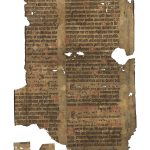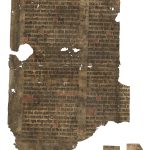The order of the first three antiphons (Amplius lava me, Salutare vultus, Sitivit in te) of the Wednesday Lauds vary from the composition of the majority of Hungarian diocesan sources (Secundum magnam misericordiam, Salutare vultus, Ad te de luce), and corresponds to the Czech sources. See CAO-ECE III/A Praha Temporale (Budapest: HAS, Institute for Musicology, 1996), 167.
The text and the melody of the antiphon Sitivit in te differs from the version of the majority of Western sources: while in these we can find the text Sitivit in te anima mea Deus meus (its shorter version ends here, the longer version continues, see in the Monumenta Monodica Medii Aevi V. Antiphonen, 8062, online version: http://antifona.zti.hu/), the antiphon’s text on the fragment is much shorter [Sitivit in te (… assumedly anima mea, although there is a very little place) Domine]. This text is present in the Breviarium notatum sign. XIV A 19 of the National Library of the Czech Republic (Národní knihovna České republiky) in Prague (f. 57v, see Fontes Cantus Bohemiae: http://cantusbohemiae.cz/source/4478). The melody of this source, however, does not agree with the melody on the fragment: the Czech source gives a simple recitative 2nd mode melody moving in the f-d range, the fragment, on the contrary, gives a 1st mode melody descending from a to d: the same melody that in the Western sources (Germany, Rhineland) comes with the s… Deus meus text variant. That is, in its text, it strengthens the Czech relation, but its melody contradicts this. (See Zsuzsa Czagány: A középkori prágai offícium liturgiai és zenei vizsgálata [Research into liturgy and music of the medieval Prague Office], PhDiss, Budapest, Liszt Ferenc Academy of Music 2002, 105–106.) It is worth looking further into this hitherto unique text-melody combination.
Zsuzsa Czagány



